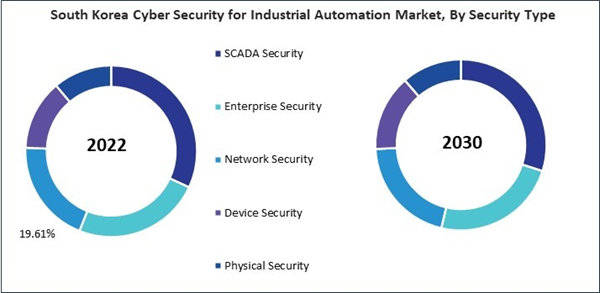The China market dominated the Asia Pacific Cyber Security for Industrial Automation Market by Country in 2022, and would continue to be a dominant market till 2030; thereby, achieving a market value of $1,791 million by 2030. The Japan market is registering a CAGR of 8.8% during (2023 - 2030). Additionally, The India market would showcase a CAGR of 10.3% during (2023 - 2030).
Cybersecurity solutions incorporate UBA to monitor user activities within industrial networks. This helps detect unusual or suspicious behavior that may indicate insider threats, such as employees or contractors with malicious intent. Organizations within the industrial automation sector often collaborate to share threat intelligence and best practices. These collaborative efforts strengthen the collective defense against common cyber threats, fostering a community-driven approach to cybersecurity. Human factors remain a significant cybersecurity concern.
Information Technology (IT) and operational technology (OT) have been treated separately. However, the convergence of IT and OT security is a growing trend. Organizations are adopting unified security strategies that bridge the gap between enterprise IT networks and industrial control systems, ensuring comprehensive protection. Zero trust security models, which assume that no entity, whether inside or outside the network, can be trusted implicitly, are gaining prominence.
Cybersecurity measures aim to ensure the continuity of manufacturing operations, protect against cyber incidents, and enable quick recovery in the event of disruptions in China. Industry 4.0 systems require advanced threat detection capabilities in China. Cybersecurity solutions incorporating machine learning for anomaly detection and rapid incident response are crucial in mitigating cyber risks in China. With the evolving threat landscape, continuous upgrades to cybersecurity measures are necessary in China. Industry 4.0 implementations demand agile cybersecurity strategies that adapt to emerging threats and vulnerabilities in China. Therefore, due to the above-mentioned factors, the market will grow significantly in this region.
Based on Type, the market is segmented into Programmable Automation System, Fixed Automation System, Flexible Automation System and Integrated Automation System. Based on Security Type, the market is segmented into SCADA Security, Enterprise Security, Network Security, Device Security and Physical Security. Based on End Use, the market is segmented into Food & Beverage Processing, Automotive Manufacturing, Electronics & Telecommunication, Pharmaceuticals, and Others. Based on Technologies, the market is segmented into Programmable Logic Controllers, Computer Numerical Control (CNC) Systems, Industrial Sensors and Others. Based on countries, the market is segmented into China, Japan, India, South Korea, Australia, Malaysia, and Rest of Asia Pacific.
List of Key Companies Profiled
- Cisco Systems Inc.
- Schneider Electric SE
- Dell Technologies, Inc.
- Rockwell Automation, Inc.
- Honeywell International, Inc.
- IBM Corporation
- ABB Ltd.
- Microsoft Corporation
- Siemens AG
- Palo Alto Networks, Inc.
Market Report Segmentation
By Type- Programmable Automation System
- Fixed Automation System
- Flexible Automation System
- Integrated Automation System
- SCADA Security
- Enterprise Security
- Network Security
- Device Security
- Physical Security
- Food & Beverage Processing
- Automotive Manufacturing
- Electronics & Telecommunication
- Pharmaceuticals
- Others
- Programmable Logic Controllers
- Computer Numerical Control (CNC) Systems
- Industrial Sensors
- Others
- China
- Japan
- India
- South Korea
- Australia
- Malaysia
- Rest of Asia Pacific
Table of Contents
Companies Mentioned
- Cisco Systems Inc.
- Schneider Electric SE
- Dell Technologies, Inc.
- Rockwell Automation, Inc.
- Honeywell International, Inc.
- IBM Corporation
- ABB Ltd.
- Microsoft Corporation
- Siemens AG
- Palo Alto Networks, Inc.









